- Clone
- MF-14 (See other available formats)
- Regulatory Status
- RUO
- Other Names
- Forkhead box protein P3, Scurfin, JM2, IPEX, Zinc finger protein JM2
- Isotype
- Rat IgG2b, κ
- Ave. Rating
- Submit a Review
- Product Citations
- publications
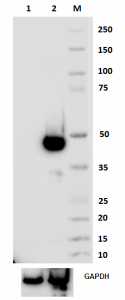
-

Total cell lysate from 293E (lane 1) and 293E transfected with plasmid encoding mouse FOXP3 (lane 2) (15 µg protein for each) were resolved by 4-12% Bis-Tris gel electrophoresis, transferred to nitrocellulose, and probed with 0.5 µg/mL of purified anti-mouse FOXP3 antibody (clone MF-14) (upper) or 1:3000 diluted purified anti-GAPDH antibody (clone Poly6314) (lower). Proteins were visualized by chemiluminescence detection using a 1:3000 diluted anti-rat IgG secondary antibody conjugated to HRP for anti-mouse FOXP3 antibody, and a donkey anti-rabbit IgG antibody conjugated to HRP for anti-GAPDH antibody. Lane M: Molecular weight ladder.
| Cat # | Size | Price | Quantity Check Availability | Save | ||
|---|---|---|---|---|---|---|
| 126401 | 25 µg | 129 CHF | ||||
| 126402 | 100 µg | 265 CHF | ||||
FOXP3 is a 47 kD transcription factor, also known as Forkhead box protein P3, Scurfin, JM2, or IPEX. It is proposed to be a master regulatory gene and more specific marker of T regulatory cells than most cell surface markers (such as CD4 and CD25). Transduced expression of FOXP3 in CD4+/CD25- cells has been shown to induce GITR, CD103, and CTLA4 and impart a T regulatory cell phenotype. FOXP3 is mutated in X-linked autoimmunity-allergic dysregulation syndrome (XLAAD or IPEX) in humans and in "scurfy" mice. Overexpression of FOXP3 has been shown to lead to a hypoactive immune state suggesting that this transcriptional factor is a central regulator of T cell activity.
Product DetailsProduct Details
- Verified Reactivity
- Mouse
- Antibody Type
- Monoclonal
- Host Species
- Rat
- Formulation
- Phosphate-buffered solution, pH 7.2, containing 0.09% sodium azide.
- Preparation
- The antibody was purified by affinity chromatography.
- Concentration
- 0.5 mg/ml
- Storage & Handling
- The antibody solution should be stored undiluted between 2°C and 8°C.
- Application
-
WB - Quality tested
- Recommended Usage
-
Each lot of this antibody is quality control tested by Western blotting. Western blotting, suggested working dilution(s): 0.01 - 1.0 µg/mL antibody in dilution buffer. It is recommended that the reagent be titrated for optimal performance for each application.
- Application Notes
-
NOTE: For flow cytometric staining with this clone, True-Nuclear™ Transcription Factor Buffer Set (Cat. No. 424401) offers improved staining and is highly recommended.
-
Application References
(PubMed link indicates BioLegend citation) - Product Citations
-
- RRID
-
AB_1089120 (BioLegend Cat. No. 126401)
AB_1089120 (BioLegend Cat. No. 126402)
Antigen Details
- Structure
- 50-55 kd protein. Forkhead/winged-helix transcription factor family, contains zinc finger and forkhead domains.
- Distribution
-
Nuclear; expressed in Treg cells.
- Function
- Master regulatory gene in Treg cell development, crucial for immune homeostasis.
- Interaction
- Interacts with DNA
- Cell Type
- Tregs
- Biology Area
- Immunology
- Molecular Family
- Nuclear Markers
- Antigen References
-
1. Ono M, et al. 2007. Nature 446:685.
2. Hori S, et al. 2003. Science 299:1057.
3. Fontenot JD, et al. 2003 Nature Immunol 4:330. - Regulation
- Present at high level in T reg cells. Induced by T cell activation.
- Gene ID
- 20371 View all products for this Gene ID
- Specificity (DOES NOT SHOW ON TDS):
- FOXP3
- Specificity Alt (DOES NOT SHOW ON TDS):
- FOXP3
- App Abbreviation (DOES NOT SHOW ON TDS):
- WB
- UniProt
- View information about FOXP3 on UniProt.org
Related FAQs
- Can I stain whole blood with anti-FOXP3 using your Foxp3 staining kit?
-
It is not recommended. It is best to use PBMCs for this testing.
- Can FOXP3 be costained with cytokines?
-
The larger holes created by the nuclear permeabilization required for FOXP3 may allow cytokines to leak out of the cell, making it harder to detect lowly-expressed cytokines. You may have to use a control where the cells are only permeabilized through the cell membrane.
Other Formats
View All FOXP3 Reagents Request Custom Conjugation| Description | Clone | Applications |
|---|---|---|
| Purified anti-mouse FOXP3 | MF-14 | WB |
| PE anti-mouse FOXP3 | MF-14 | ICFC |
| Alexa Fluor® 488 anti-mouse FOXP3 | MF-14 | ICFC,IHC |
| Alexa Fluor® 647 anti-mouse FOXP3 | MF-14 | ICFC |
| Pacific Blue™ anti-mouse FOXP3 | MF-14 | ICFC |
| Brilliant Violet 421™ anti-mouse FOXP3 | MF-14 | ICFC |
| True-Nuclear™ One Step Mouse Treg Flow Kit | MF-14 | ICFC |
| Alexa Fluor® 700 anti-mouse FOXP3 | MF-14 | ICFC |
Customers Also Purchased
Compare Data Across All Formats
This data display is provided for general comparisons between formats.
Your actual data may vary due to variations in samples, target cells, instruments and their settings, staining conditions, and other factors.
If you need assistance with selecting the best format contact our expert technical support team.
-
Purified anti-mouse FOXP3
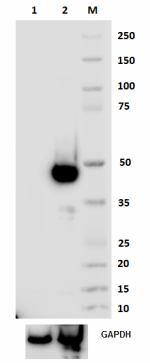
Total cell lysate from 293E (lane 1) and 293E transfected wi... -
PE anti-mouse FOXP3
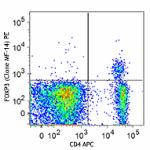
C57BL/6 splenocytes were surface stained with CD4 APC and th... 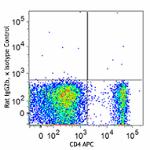
-
Alexa Fluor® 488 anti-mouse FOXP3
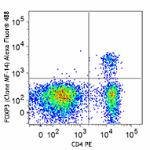
C57BL/6 splenocytes were surface stained with CD4 PE and the... 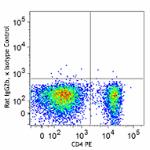
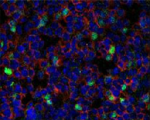
OCT frozen mouse lymph node 5 µm sections were fixed with 4%... -
Alexa Fluor® 647 anti-mouse FOXP3
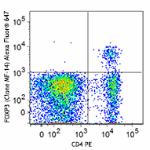
C57BL/6 splenocytes were surface stained with CD4 PE and the... 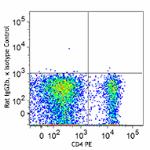
-
Pacific Blue™ anti-mouse FOXP3
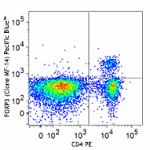
C57BL/6 splenocytes were surface stained with CD4 PE and the... 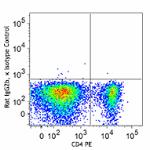
-
Brilliant Violet 421™ anti-mouse FOXP3
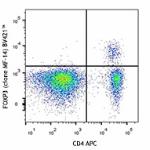
C57BL/6 splenocytes were surface stained with CD4 APC and th... 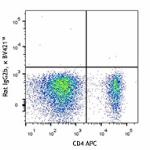
-
True-Nuclear™ One Step Mouse Treg Flow Kit
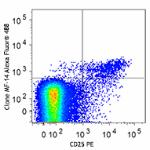
C57BL/6 splenocytes were stained with True-Nuclear™ One Step... 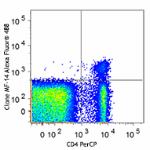
-
Alexa Fluor® 700 anti-mouse FOXP3

C57BL/6 splenocytes were surface stained with CD4 PE and the...
 Login / Register
Login / Register 




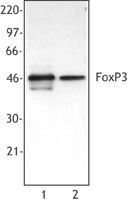
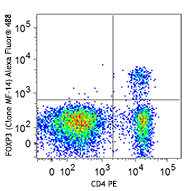

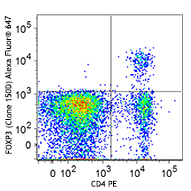



Follow Us